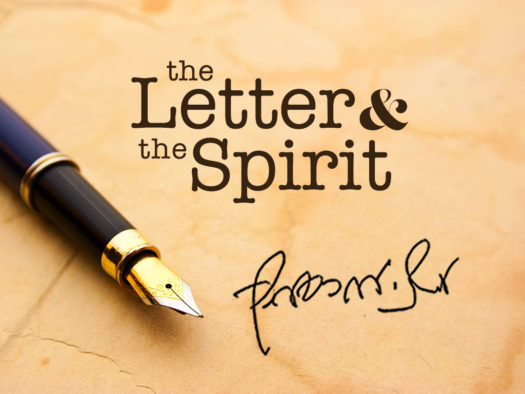
Weekly Letter: Highlights on the Parsha
The following are HIGHLIGHTS on the Parsha – Sedra Acharey – composed by Rabbi Nissan Mindel and annotated by the Rebbe. Rabbi Mindel’s literary works – done at the behest of the Rebbe – had the distinction of being reviewed and annotated by the Rebbe before being published in their final version.
Alongside this final draft, is the original draft with the Rebbe’s corrections and additions.
Highlights
The sedra begins with the verse “And G-d spoke to Moshe after (Acharei) the death of the two sons of Aharon, when they drew near before G-d, and died.” (Lev. 16:1)
The meaning of “drew near” before G-d is not explained here. But several sedras earlier, in the Sedra Shmini (10:1-3), the tragic death of Aharon’s two eldest sons, Nadav and Avihu, is related in detail. This happened on the day of Rosh Chodesh Nissan, almost one year after the Exodus. It was the eighth day of miluim, the inauguration of the Tabernacle-Sanctuary, when the Sanctuary was finally erected and consecrated. During each of the earlier seven days, the Tabernacle-Sanctuary was put up for the Divine service and thereafter taken apart, but on the eighth day, the Sanctuary was erected and remained standing until the Children of Israel resumed their journey to the Promised Land. It was a very special and joyous day for Moshe Rabbeinu, seeing the final completion and inauguration of the Sanctuary; it was a happy day also for Aharon and his sons, who were installed to do the sacred service in the Sanctuary; and it was a very happy day for all our Jewish people, seeing the Divine Revelation and the signs of G-d’s love for His people, when the Cloud of Glory filled the Sanctuary and a fire came down from heaven and consumed the offerings on the Mizbe’ach (Altar). It was on that very special and joyous day that the tragic death of Aharon’s two eldest sons occurred, and brought grief to all in the midst of all the joy.
What did Nadav and Avihu do that cost them their life? Several things, each of which was unforgivable for such great men as they were. They allowed themselves to be soc carried away by their enthusiasm ad zeal to “come near” to Hashem, that they brought into the Sanctuary and on the Mizbe’ach fire from outside. The Torah calls it “alien fire” for, indeed, it was not holy fire that they brought into he Sanctuary.
A further sin was that they had not consulted their higher authorities – Moshe and Aharon – not accepted their authority.
The very tragic event in the midst of an otherwise most joyous and solemn celebration, was an extraordinary Kidush Hashem, with eternal moral lessons for every Jew in all generations.
Commenting on the first verse of this Sedra, the Zohar declares that “Whoever is moved to tears while reading this portion of the Torah is assured of forgiveness for his own sins and his children will be blessed with long life.”
The entire first section (chap. 16) of this Sedra is the Torah reading in the Morning Prayer of Yom Kippur, the Day of Atonement, because this section also deals with the Devine Service in the Beis Hamikdosh on the Day of Yom Kippur, which was to be conducted by the Kohain Godol, as it was first conducted by the first Kohain Godol, Aharon, on the day of Yom Kippur.
Following the above section, the Sedra deals with the Laws of Sacrifices and of aspects of holiness in the everyday of a Jew.
The last section deals with forbidden marriages and immoral conduct and warns against the abominable practices and customs which were current in ancient Egypt, from which our Jewish people was delivered and in the Land of Canaan, to which our people was on the way to inherit.
One of the highlights in this section is the verse, “You shall, therefore, keep My statutes and My ordinances (mitzvos) that a Jew should do them and live by them; I am HaShem” (18:5). Here the Torah tells us, among other things, that not only is the Torah, with all its mitzvos, the true and only guide by which Jews live in their everyday life, but that this is the source of life. This was also say in otr daily prayer, when we declare that the Torah and mitzvos are “Our life and the length of our days.”












